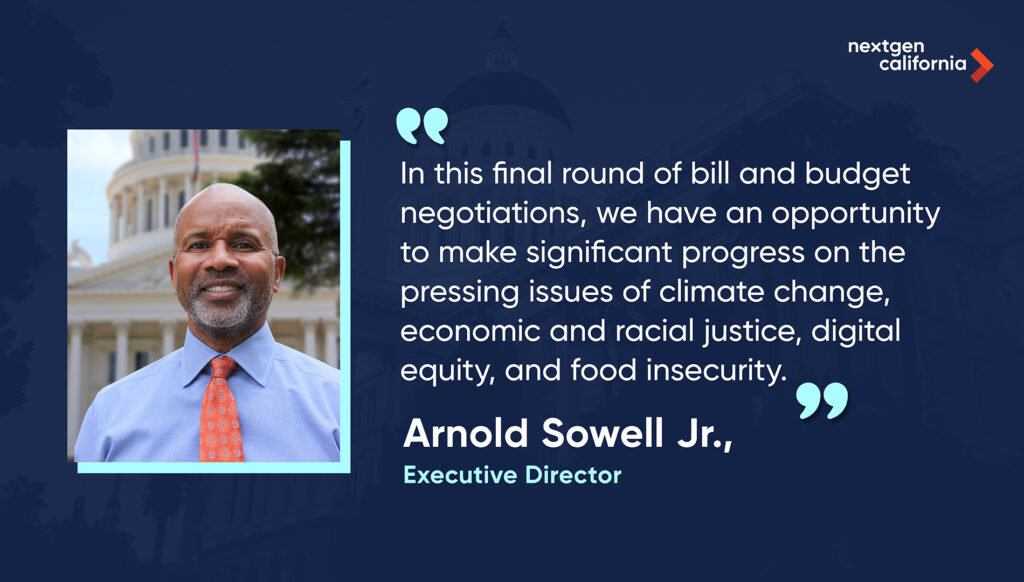NextGen California Shares Updates on Upcoming Priorities for the Last Month of the Legislative Session

For Immediate Release: August 4, 2022
Contact: Robin Swanson, robin@swansoncomm.net
Policy changes and budget investments related to economic, digital, and racial equity as well as food access, criminal justice reform, and bold climate action top the list of priorities for NextGen
SACRAMENTO – Today, NextGen California released a statement on their bill and budget priorities for the final month of the legislative session. The 2021-22 legislative session ends on August 31 and in these final weeks NextGen will push for passage of and funding for issues that address racial equity, food access, criminal justice reform, digital equity, and climate action.
Statement from NextGen California Executive Director, Arnold Sowell Jr.:
“As the legislative session winds to a close, NextGen’s advocacy efforts will be focused on budget solutions and policy changes that will help California advance justice and equity throughout all California communities. In this final round of bill and budget negotiations, we have an opportunity to make significant progress on the pressing issues of climate change, economic and racial justice, digital equity, and food insecurity. California’s leadership in these key policy areas stands to make real impacts and lasting change, and NextGen looks forward to working with the Legislature, Governor, and our coalition partners on getting these critical issues across the finish line by the end of the legislative session.”
NextGen California is prioritizing and calling on the Governor and Legislature to tackle the following bills and budget investments during the last month of the 2021-2022 legislative session:
- Climate Funding Package and Increased Climate Ambition – Finalize the $54 billion-plus California Climate Commitment in the state budget and rise to the Governor’s call to enact climate policy this year that increases the ambition of our greenhouse gas reduction targets, accelerates clean energy deployment, and protects Californians from the high costs and health harms caused by oil and gas companies. In particular, we call on the legislature to accelerate our 2030 climate pollution reduction target to 50% below 1990 levels by 2030, and to establish a 90% reduction target and carbon neutrality deadline for 2045 or sooner. This year’s $39 billion climate budget builds upon last year’s historic $15 billion climate investment and accelerates progress on clean energy, healthy communities, environmental justice, and protection from heat, fire, drought, and extreme weather events in the coming years.
- SB 17 – Create and fully fund the Office of Racial Equity. SB 17 is currently in the Assembly Appropriations Committee where its cost is being determined and there are a couple key legislative steps the bill still must cross before it can head to the Governor’s desk for signature.
- SB 907 – Make the investments needed to fully implement the Local Equitable Access to Food (LEAF) program over the coming years. The next step is a vote in the Assembly Appropriations Committee and then final votes on the Assembly and Senate Floor before moving to the Governor’s desk.
- AB 256 – Build off the progress made in 2020’s Racial Justice Act, and pass the Racial Justice Act for All this year in order to help the Black & Brown people who were already harmed by racism in our courts and are unjustly languishing in jails & prisons right now. Currently in the Senate Appropriations Committee, this bill will move on to floor votes in both the Senate and Assembly before heading to the Governor’s desk for signature.
- AB 2632 – Ban the use of solitary confinement for individuals with disabilities, pregnant persons, and the elderly, among others and bring the state’s use of solitary confinement more closely in line with international standards. AB 2632 needs to pass the Senate Appropriations Committee and then clear the Senate Floor and back to the Assembly for a final vote before it heads to the Governor’s desk for signature.
- AB 2438 – Take a major step toward reducing emissions in California’s most polluting sector by incorporating important equity and public health recommendations from California’s Climate Action Plan for Transportation Infrastructure (CAPTI) in transportation project guidelines. Currently scheduled for a hearing in the Senate Appropriations Committee, AB 2438 has several legislative hurdles to clear before it can land on the Governor’s desk for signature.
- SB 1162 – Pass this critical piece of legislation that will prevent gender and race-based pay disparities by requiring pay transparency at every stage of the employment process. The Assembly Appropriations Committee is currently considering the bill’s cost to the state, and then SB 1162 must get a final vote in both houses before heading to the Governor’s desk for signature.
- AB 2750 – Create a State Digital Equity Plan to close the digital divide, including the establishment of a California Connect Corps to help people get online and receive digital literacy training and IT support. The next step is a vote in the Senate Appropriations Committee and then a final vote on the Senate Floor before moving to the Governor’s desk for a signature.
- SB 1391 – Ensure that the California Air Resources Board (CARB) conducts a regular review of the Cap-and-Trade program and evaluates and addresses concerns with the design of the program to ensure it is designed to meet its policy objectives. The Assembly Appropriations Committee is currently considering the bill’s cost to the state, and then SB 1391 must get a final vote by both houses before heading to the Governor’s desk for signature.
NextGen California is committed to working with the Newsom Administration, the State Legislature, and our diverse coalition of partners, to raise the bar on progress by securing a final California State Budget that promises to deliver a prosperous and equitable future for all Californians.
###
The mission of NextGen California is to fight for progressive policy change to address environmental, social, racial, gender, and economic inequities in California through justice-centered legislative advocacy, grassroots partnerships, and democratic civic engagement.